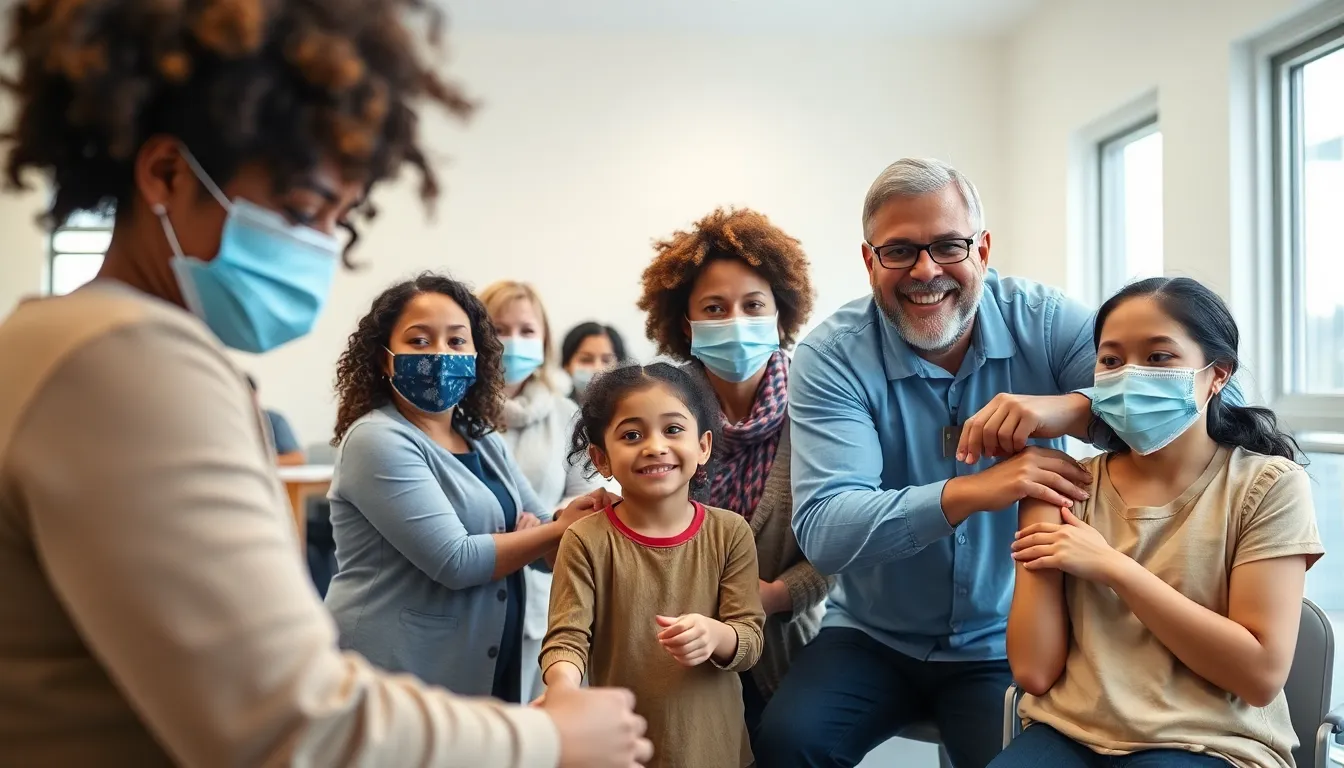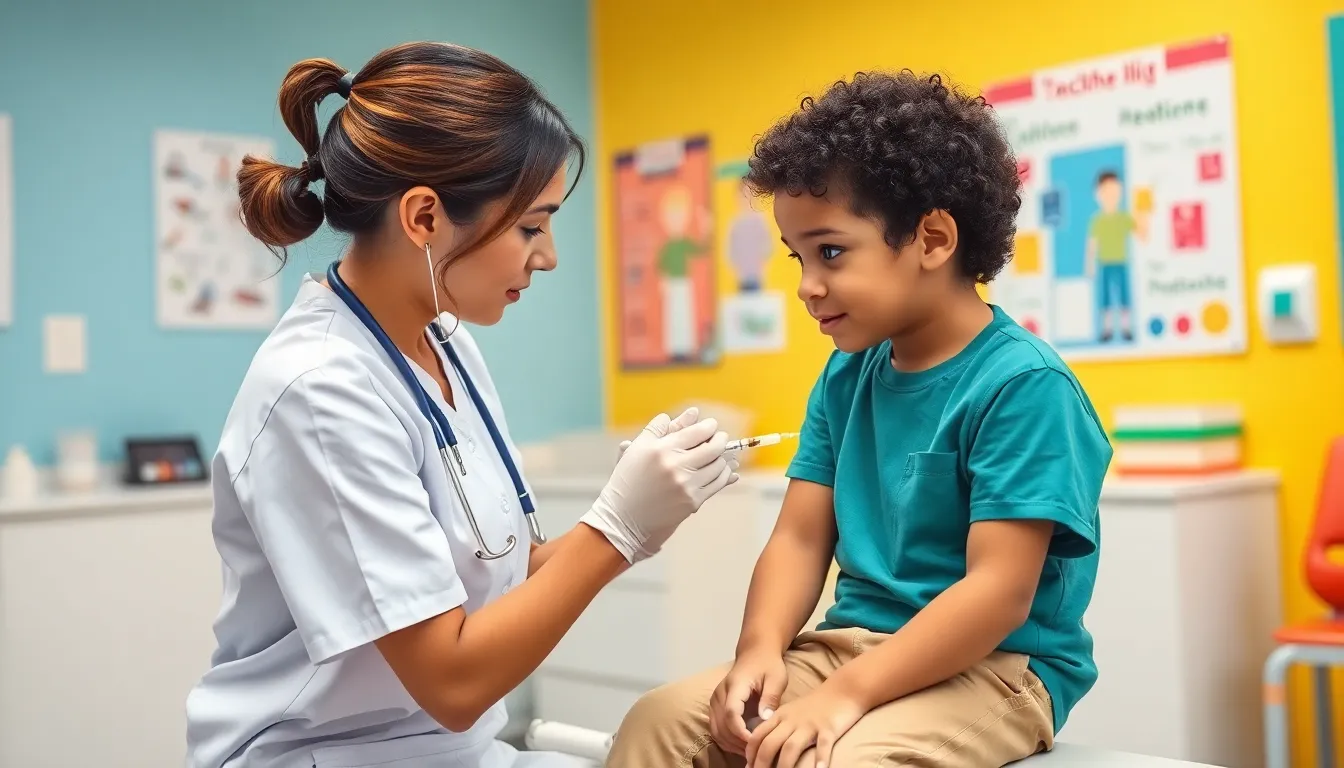Vaccination plays a crucial role in public health, protecting individuals and communities from preventable diseases. With an ever-evolving landscape of pathogens and emerging health threats, staying informed about vaccination recommendations is essential for everyone. Understanding which vaccines are necessary at different life stages can help individuals make informed decisions that safeguard their health and the health of those around them.
As health experts continuously update guidelines based on the latest research, navigating the world of vaccinations can be overwhelming. This article aims to clarify the current vaccination recommendations, making it easier for readers to understand what they need and when. By following these guidelines, individuals can contribute to a healthier society while ensuring their own well-being.
Table of Contents
ToggleOverview of Vaccination Recommendations
Vaccination recommendations guide individuals on necessary immunizations throughout their lives. These guidelines may differ by age, health status, and risk factors. The Centers for Disease Control and Prevention (CDC) and the World Health Organization (WHO) provide comprehensive schedules outlining which vaccines individuals should receive and when.
Childhood Vaccination Schedule
- Birth to 6 years: Vaccines include Hepatitis B, DTaP, IPV, Hib, PCV, and MMR.
- 7 to 18 years: Tdap, HPV, and meningococcal vaccines are recommended.
- Age-specific vaccinations: Request updated schedules from healthcare providers.
Adult Vaccination Recommendations
- Flu Vaccine: It’s recommended annually for adults.
- Tetanus/Diphtheria: Booster doses every 10 years.
- Shingles: It’s advised for adults 50 and older to receive a vaccination.
Special Populations
- Pregnant individuals: Vaccination for flu and Tdap during pregnancy helps protect newborns.
- Immunocompromised individuals: Specific vaccines may be contraindicated; consult a healthcare provider for tailored guidance.
Travel Vaccinations
- Regional requirements: Vaccinations for yellow fever, typhoid, and hepatitis A depend on travel destinations.
- Consultation: Meeting with a travel health specialist before international travel ensures up-to-date protection.
Importance of Staying Informed
Staying current on vaccination recommendations promotes personal well-being and community health. Individuals should regularly consult healthcare providers about any updates or changes in vaccination guidelines tailored to their specific health needs and life circumstances.
Importance of Vaccination

Vaccination plays a crucial role in promoting overall public health and protecting individual well-being. Understanding its significance helps individuals make informed choices about their health.
Benefits for Public Health
Vaccination contributes significantly to community immunity, also known as herd immunity. When a large percentage of the population is vaccinated, it slows the spread of infectious diseases, protecting those who cannot be vaccinated, such as infants or immunocompromised individuals. This collective protection reduces the likelihood of outbreaks. The CDC reports that vaccinations prevent approximately 2-3 million deaths each year from diseases like measles and diphtheria. Additionally, widespread vaccination reduces healthcare costs related to treating vaccine-preventable diseases and promotes productivity by decreasing sick days among the population.
Individual Health Protection
Vaccines enhance individual health by providing immunity against specific diseases. Vaccination effectively reduces the risk of severe complications associated with illnesses. For instance, the HPV vaccine protects against certain cancers linked to the virus, while the flu vaccine reduces the likelihood of hospitalization due to influenza. Maintaining up-to-date vaccinations is essential for personal health, especially for individuals with underlying health conditions. Moreover, when individuals receive their vaccines, they contribute to the overall containment of diseases in their communities, leading to a healthier environment for everyone. Regular consultations with healthcare providers help ensure vaccination schedules align with personal health needs.
Vaccination Schedules
Vaccination schedules outline the recommended immunizations necessary for individuals at various life stages. These schedules ensure protection against preventable diseases and vary based on age, health status, and specific risks.
Pediatric Vaccination Schedules
Pediatric vaccination schedules address the immunization requirements for children from birth to 18 years. Key vaccines include:
| Age Group | Vaccines |
|---|---|
| Birth to 6 years | Hepatitis B, DTaP, Hib, IPV, MMR, Varicella |
| 7 to 18 years | Tdap, HPV, Meningococcal |
The CDC recommends administering these vaccines according to the following timeline:
- Birth: Administer Hepatitis B vaccine within 24 hours.
- 2 months: DTaP, Hib, IPV, PCV, and RV vaccinations.
- 12 to 15 months: MMR and Varicella vaccines.
- 11 to 12 years: Tdap and HPV vaccinations.
Following these schedules promotes immunity in children, minimizing the risk of serious health complications. Pediatricians provide essential guidance for parents to ensure timely vaccinations.
Adult Vaccination Schedules
Adult vaccination schedules include recommendations for immunizations necessary for maintaining health in adulthood. Important vaccines consist of:
| Age Group | Vaccines |
|---|---|
| 18 to 64 years | Annual influenza, Tdap booster every 10 years, HPV (if not vaccinated) |
| 50 years and older | Shingles, Pneumococcal |
| Pregnant individuals | Tdap during each pregnancy, Influenza |
Key recommendations include:
- Annual influenza vaccine: Essential for everyone 6 months and older.
- Tdap booster: Recommended every 10 years, starting at age 11 or 12.
- Shingles vaccine: Advised for adults 50 and older to reduce the risk of shingles and its complications.
Following adult vaccination schedules supports overall health and reduces the spread of vaccine-preventable diseases within the community. Regular consultations with healthcare providers help ensure adults stay updated on their vaccination needs.
Common Vaccines and Their Recommendations
Vaccination recommendations encompass a variety of vaccines tailored to different population groups and circumstances. Understanding routine vaccines and any necessary travel vaccines helps maintain individual and community health.
Routine Vaccines
Routine vaccines are essential for all individuals, beginning in childhood and continuing into adulthood. The following vaccines are typically included in routine schedules:
- Hepatitis B: Administered at birth, with additional doses at 1-2 months and 6-18 months.
- DTaP (Diphtheria, Tetanus, Pertussis): Given at 2, 4, and 6 months, with booster doses at 15-18 months and 4-6 years.
- MMR (Measles, Mumps, Rubella): Recommended at 12-15 months and again at 4-6 years.
- Varicella (Chickenpox): Administered at 12-15 months, with a second dose at 4-6 years.
- Tdap (Tetanus, Diphtheria, Pertussis): A single dose for adolescents at 11-12 years, followed by Td boosters every 10 years for adults.
- HPV (Human Papillomavirus): Recommended for individuals aged 11-12 years, administered in a two- to three-dose series.
- Meningococcal: Given to adolescents at 11-12 years, with a booster at 16 years.
Adults should also receive annual influenza vaccines, Tdap boosters, and shingles vaccinations at age 50. Regular consultations with healthcare providers ensure adherence to recommended schedules based on age and health status.
Travel Vaccines
Travel vaccines protect against infectious diseases encountered in specific regions. Before international travel, individuals should consult healthcare providers for required and recommended vaccines, such as:
- Hepatitis A: Recommended for travelers to countries with poor sanitation or limited access to clean water.
- Typhoid: Suggested for travelers to regions with elevated typhoid risk.
- Yellow Fever: Required for entry into some countries in Africa and South America.
- Rabies: Recommended for travelers exposed to animals or visiting remote areas.
Staying informed about regional vaccination requirements helps prevent illness while traveling and ensures a safe travel experience. Regular discussions with healthcare providers facilitate awareness of vaccination needs based on specific destinations.
Addressing Vaccine Hesitancy
Vaccine hesitancy poses a significant challenge to public health efforts. Understanding common concerns and implementing effective strategies can encourage vaccination uptake.
Common Concerns and Misconceptions
Concerns often arise from misinformation regarding vaccine safety, effectiveness, and necessity.
- Safety Concerns: Many individuals fear side effects or adverse reactions. Vaccines undergo rigorous testing and monitoring by entities like the CDC and WHO, ensuring safety for the public.
- Effectiveness Doubts: Some question whether vaccines provide sufficient protection. Data shows vaccines prevent illness, hospitalization, and deaths from various diseases, including influenza, measles, and COVID-19.
- Natural Immunity Beliefs: A common misconception is that natural infection offers better protection than vaccines. While natural infections can confer immunity, they often involve serious health risks, whereas vaccines provide a safer method to gain immunity.
- Distrust in Pharmaceutical Companies: Concerns about profit motives contribute to hesitancy. Transparency in vaccine development and approval processes can help rebuild trust.
Strategies to Encourage Vaccination
Effective strategies help address vaccine hesitancy and promote vaccination:
- Education Initiatives: Providing accurate information through healthcare providers, community workshops, and online platforms helps clarify vaccine benefits and dispel myths.
- Personal Testimonials: Sharing stories from vaccinated individuals or healthcare professionals can humanize the experience and illustrate the importance of vaccines.
- Engaging Community Leaders: Collaboration with trusted community figures fosters acceptance and encourages group discussions around vaccinations.
- Addressing Specific Concerns: Tailoring communication to address individual fears or misconceptions enhances understanding and builds trust.
- Access and Convenience: Ensuring easy access to vaccines through local clinics and outreach programs improves participation rates.
- Incentives: Offering incentives such as free health check-ups or community events can motivate individuals to get vaccinated.
- Continuous Support: Ongoing communication with healthcare providers reassures individuals and provides a platform for discussing any questions or concerns post-vaccination.
Implementing these strategies creates a supportive environment that encourages informed vaccination decisions.
Vaccination is a vital aspect of maintaining individual and community health. Staying informed about vaccination recommendations ensures that everyone receives the necessary immunizations at the right times. This proactive approach not only protects against preventable diseases but also contributes to the broader concept of herd immunity.
Regular consultations with healthcare providers play a crucial role in keeping vaccination schedules up to date. By addressing concerns and misconceptions surrounding vaccines, individuals can make informed decisions that benefit both themselves and those around them. Ultimately, embracing vaccination as a shared responsibility fosters a healthier society for all.




